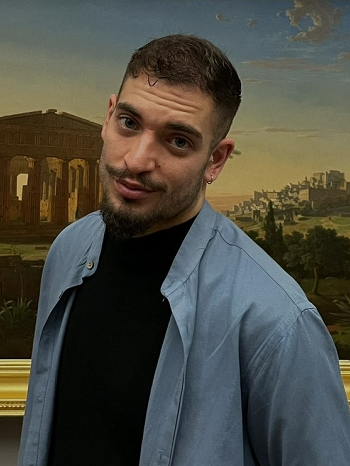Andreas Leventis M.A.

Ancient Objects and Visual Studies (AOViS)
Classical Archaeology
Institut für Klassische Archäologie
Fabeckstraße 23-25
14195 Berlin
10/2022 – 10/2024
National & Kapodistrian University of Athens, Greece
Postgraduate Program "Archaeology and Hostory of the Ancient World: From Early Prehistory to the Late Antiquity"
Disciplinary orientation option "Classical Archaeology"
Master thesis: "Pottery from Hypogeum A of Shatby Cemetery in Alexandria of Egypt" (supervisor: N. Dimakis)
10/2023 – 02/2024
Freie Universität Berlin
Erasmus + Masters Program Studies
Subject: Classical Archaeology
12/2019 – 09/2022
National & Kapodistrian University of Athens, Greece
Bachelor: Archaeology & History of Art
07/2025 – 07/2025
Employment: Rescue Excavation of Ephorate of Antiquities of Piraeus and Islands
Field Archaeologist
Plot: Athinaidos 25 Street, Voula, Attica
12/2024 – 01/2025
Employment: Rescue Excavation of Ephorate of Antiquities of Piraeus and Islands
Field Archaeologist
Plot: Achilleus 6 & Alexandras 5 Street, Voula, Attica
12/2024 – 12/2024
Employment: Rescue Excavation of Ephorate of Antiquities of Piraeus and Islands
Field Archaeologist
Plot: Demokratias 25 Street, Voula, Attica
12/2022 – 04/2023
Employment: Rescue Excavation of Ephorate of East Attica
Field Archaeologist
Plot: Levidou 30 Street, Kifisia, Attica
07/2022 – 08/2022
Employment: Ministry of Culture and Sports Directorate of Prehistoric and Classical Antiquities, Athens
Practical Training
Director: Gadolou Anastasia (now: General Director of the Archaeological Museum of Thessaloniki)
09/2024 – 01/2025
Employment: "Educational Archexplore"
Tour Guide
Guided Tours in Historical Center of Athens
09/2019 – 06/2024
Employment: "Friends of Byzantine Monuments Association"
Tour Guide
Guided Tours in Historical Center of Athens
Exploring Funerary Landscapes and Material Culture: The Study of Hellenistic and Roman Burial Assemblages in Kos
This doctoral research project is poised to make significant contributions to the field of funerary archaeology by investigating the burial assemblages of the necropolis at Marmaroto on the island of Kos during the Hellenistic and Roman periods. Despite the island's critical geographical position and historical significance as a major trading hub, the archaeological remains of Kos have received limited scholarly attention, particularly concerning its necropoleis. This study aims to address this gap by systematically analyzing the Kavoura and Ploumi-Vallianatou plots, which offer rich data for understanding the social, cultural, and religious dynamics of ancient Kos. The research will explore how burial practices reflect broader societal values and political identities, revealing the complexities of life and death in ancient communities. Employing advanced methodologies, including GIS spatial analysis and photogrammetry, the project will document and analyze burial architecture, grave goods, and epigraphic evidence. This innovative approach will yield new insights into the typological and chronological developments of burial practices, enabling a comprehensive understanding of the material culture associated with the necropolis. Expected outcomes include a detailed typological classification of burial structures and grave goods, a comparative analysis with other Aegean and Mediterranean assemblages, and a clearer picture of the cultural exchanges that influenced the evolution of funerary practices on Kos. By synthesizing these findings, the research aims to elucidate the shifting social and religious landscapes from the Hellenistic to the Roman periods, thus contributing to the broader discourse on ancient societal structures and the role of funerary practices in shaping collective memory. Ultimately, this study aspires to enhance scholarly understanding of the necropolis of Kos and its significance within the wider context of classical antiquity.
Die Dissertation wird gefördert durch ein Stipendium des DAAD-GSSP.
